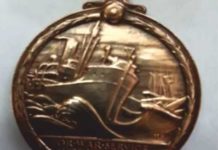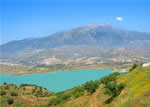Big Mouth complaining about sport. Perhaps he would like to take it up? He could try out for the Grapevine football team, for instance…
Money, Drugs, Politics
(a.k.a. sport)
Well, we’ve now had the Chinese Olympics, in which Britain (sorry, Team GB’) did well. We saw the GNP of several developing countries changing hands over and under the counter (money) and the brilliant application of modern science and old fashioned cunning (drugs), all presented in a fantastic, multi-faceted, complex performance (world-politics).
I love sport. Correction: I loved sport. The Olympics, the Tour de France, and the First Division: these competitions were the focus of my naive youth. But now sport takes second, third or no place; it limps in behind marketing pomp, shows of wealth and power, and corruption.
The love of money has ruined sport. There’re wads of cash to be had: from sponsors, governments, advertisers, TV companies and merchandise; for athletes, coaches, advisers, medics, pundits, agents, P.A.’s and supervisors. It is accepted: during the Olympics I heard a BBC interviewer asking a pundit for a “cost benefit analysis of our medal tally”: sport assessed in boardroom jargon. Those billions of dosh: a deadly overdose for sportsmanship.
Just look at money in football: the conversion of the first division into the Premiership global business, run by Russian Mafiosi and Thai human rights abusers, played by prima-dollar-donas without an iota of loyalty to fans, team-mates, club or country, who delight in spending obscene wages on high-stakes gambling, hookers and coke, while the stadia are filled with corporate businessmen and glory-hunters. In the old days the football was cruder but cleaner, the grounds were named after the road they were in and the Club for its City or District. In the old days kids played football: now they play X-Box . Now the clubs move out of town into grounds named after airlines or beers, all part of the whirligig of money shelled out by fools like us to declare our allegiance to O2, Samsung or Acer.
Of course, football is now a game for professionals while the Olympics are competitions for amateurs. That’ll be amateurs like Raphael Nadal who won gold in Beijing. These ‘amateurs’ spend years training, with coaches, doctors, sponsors, advisors at their beck and call; if successful they’ll make a living off the back of it, and the fame it brings, for years. That is, if they aren’t caught doping.
It’s no surprise drugs are insidiously available. The fame and the excessive rewards put athletes are under terrific pressure. In the key strength based sports, such as sprinting, swimming or cycling, so many of the world records, the medals and other honours are dope propelled, that it seems that they are closer to being a competition between pharmaceutical companies.
Consider the Tour de France: once an enthralling display of physical endurance, tactical skill and personal commitment. Now the qualification competitors need most is the will to win at any cost. This makes doping just part of the contest. Dozens of cyclists have been caught, undermining the individual, the Tour and the sport itself.
Lance Armstrong’s an example. He has won the Tour, year after year, has never been proved a drug cheat. He should be universally celebrated as a cycling hero. But that is undermined by doubt. He has repeatedly beaten top cyclists we now know were doped up to their eyeballs; either a staggering achievement or a suspicious excellence. He’s been accused of false results, of confessing to his medic, of using EPO, of having Androstenine in his room. Accusations have come from journalists, competitors, staff and team-mates. Confusingly, in his battle of cancer Armstrong had legitimate use of steroids and EPO to counter the destructive effects of chemotherapy. Armstrong’s vehement denials, though, don’t count for much: all the cheats swear-blind they’re innocent. In a sport so riddled with deceit Armstrong can’t clear his name as everyone is a suspect.
Doping seemed to take off first in the Eastern European countries for track and field: sprinters, discus throwers, shot-putters etc. The masculinised women were mocked, the robotic muscle-bound men were feared and it was dismissed as a foreign problem, a by-product of the USSR obsessions.
Unfortunately the whole world is now cheat-city. There have been many banned athletes whose cases are controversial, who just might, be innocent: think Linford Christie or Dianne Modahl. There are those never caught but patently are guilty, such as Flo-Jo. And there are the proven cheats, such as Ben Johnson or Marion Jones.
Florence Griffiths-Joyner is perhaps the saddest of famous dopers. At the ’88 Seoul Olympics Flo-Jo suddenly exploded from the blocks to win in outrageously fast times. This was a svelte runner who’d been no more than an adequate competitor for some years. In about eight months she’d mutated to a bulging jumble of sinew and muscle, to the extent that fellow sprinters didn’t recognise her. She was suddenly able to run as fast as Jesse Owens did in Berlin, tearing apart the women’s world record, and grinning and waving as she crossed the line. In the same week she announced she was leaving the sport. She died young, having the seizures to which steroid abuse makes you vulnerable. Sometimes sport isn’t good for the health.
Flo-Jo died, most are just disgraced. In Seoul, the Olympics Flo-Jo cheated gold in, Ben Johnson won the 100 metres, also in record time. His anabolic steroid cheating had him stripped of his medal. In Sydney in 2000 Greek sprinters Kederis and Thanou both won medals (Thanou got silver behind Marion Jones), but in Athens these top Greek sprinters missed tests, went to ground and dropped out. The rich and famous Marion Jones lost everything: her insistent denials reached the courtroom and were shown to be perjury: she was sent to prison after a tearful apology to all. Where did this leave her relay-team-mates? Handing back their medals, guilty by association. Where does all this leave the world records and the honour of an Olympic medal? The drug takers compete and gain honours all the time; when they are caught the tests cannot confirm when they started cheating: we can’t know which records are synthetically achieved and which are the result of personal endeavour.
Money and drugs. Lets be honest though, the countries of the world don’t fight to hold the Games as a money-spinner. The cost of staging them are is the kind of money that could put a developing country’s finances into the black. But the Olympics can be a demonstration of power: power to organise, control, drive; to produce winning athletes, accommodate the rest of the world and do business. It can also provide a not insignificant boost of pride to the home population, and a happy population doesn’t hurt incumbent politicians.
Did China follow the USSR approach of handing out syringes with every Olympic pass? Some Chinese teams have been suspect. A rapid rise in a strength sport, in which China had never performed well in the past is suspicious. In Sydney Chinese swimmers were suddenly winning by seconds. But since then, such dubious results have disappeared.
China wanted the Olympics as an expression of power: the power to organise, to control, to drive. Like the old USSR, China is desperate to punch its weight on the world stage. But the Olympics turn the eyes of the world not just on your competence by on your cock-ups. Beijing’s pride may have made it determined to be above reproach. China, paranoid, secretive and belligerently proud, may have used its formidable control over its athletes to make damn sure none of them were doping.
China also cleaned up pollution, as far as it practically could, and shut-up human-rights controversies, as far as it was able to. They did show up the IOC’s claims that the Games would transform Chinese politics as naïve: Amnesty International said that human rights worsened prior to and during the Olympics as Beijing fought to silence any potential critics.
Sport is a like an animal display, used to show strength without having to fight. No wonder sport is linked to politics. And, unlike the money and drugs, that link isn’t new: any Classics teacher will tell you that the corruption of the Olympics into an expression of national strength goes back to the days of ancient Greece. But it is a pity. Sport can be an expression of human ability and excellence, competitors striving to beat their own limits (which makes doping self-defeating). From America’s Jessie Owens, running in the Berlin Olympics in spite of bigotry, to Cambodia’s Hem Bunting, running in spite of grinding poverty, to Samiya Yuusf Omar from Somalia, training in spite of harassment from harassment of sexist militiamen, there are still sportsmen to be admired.
Perhaps we should copy them: instead of watching the cheats, do the sport ourselves. If only I weren’t such an old crock! So, respect to Alec and the rest of the Grapevine team! You may not be earning millions, fighting off the gold-diggers, winning every week. But at least you are out there playing football. What do you mean, you’d rather swap?





















